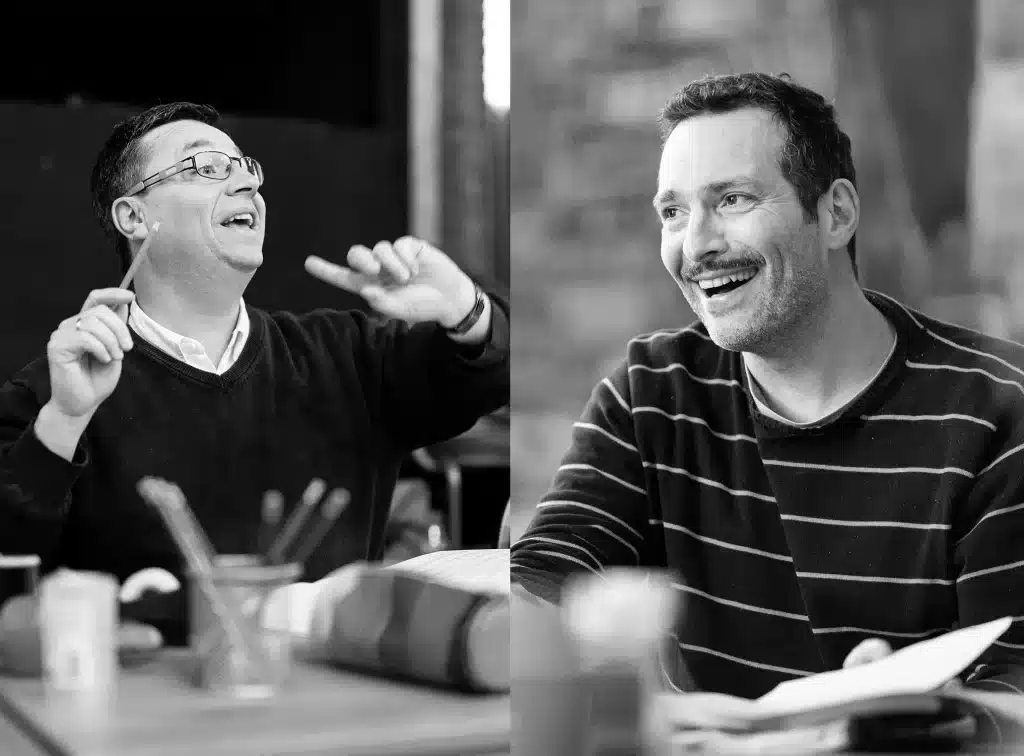Interview Enrico Delamboye and Benjamin Prins about collaboration Orphée aux Enfers

Opera Zuid asked conductor Enrico Delamboye and director Benjamin Prins if they would like to stage Offenbach’s Orphée aux Enfers together. Their answer was as clear as it was enthusiastic; and whether they feel like it!
What makes this opera typically Jacques Offenbach?
Enrico: ‘Orphée aux Enfers is funny, lively, critical and it never gets boring.’
Benjamin: ‘It’s smart entertainment. That’s in all the satirical jokes, but also in the use of different timelines. That makes it very clever. That is why we have placed it in a neoclassical framework. That provides the perfect basis for this non-chronological piece to talk about then and now.’
There is a special role for dance in this opera…
Benjamin: ‘Yes, just like in the original (which includes ballet), we deliberately chose to work with live dancers. They actually bring everything together; their bodies tell more than words in this case. They prove to be the glue between the music and the drama, which is not surprising, because this opera is all about dance! Eurydice is done being “the wife of”. She wants to become Bacchante, a dancer, an artist, a woman who chooses her own way of life.’
A Bacchante? Benjamin: ‘In nineteenth-century France, everyone knew what the Bacchante stood for: she was the image of the popular, wild dance, free of rules. The Bacchantes were “followers” of the god Bacchus and he was the god of wine, of drunkenness, of a certain wildness and excess. The fact that Eurydice chooses that, chooses herself… everyone thinks something about that. But beware, there’s a little plot twist…!’
Unlike directing, the music is prescribed. What can a conductor add to Offenbach’s music?
Enrico: ‘His music is light as a feather and witty. Offenbach is about the things you don’t expect; you need perfect timing for that. To the audience, it should seem as if everything goes by itself and it is completely self-evident. And what do I add? Of course my musicality and my vision when it comes to language in relation to tempo, for example. But this music also needs a lot of liveliness, so all the fun and humor I have in me – not so difficult with this profession! – I put in music and conducting. I think the most important thing is that, without making a sound myself, I am the initiator of the music. I activate all musicians and give them the opportunity to bring the right energy and feeling into the music. After all, we have to do it together!’
And how is that collaboration going between the two of you?
Benjamin: ‘We actually came up with the whole concept together and we are still constantly fine-tuning. finetunen.’ Enrico: ‘Indeed, we greatly respect each other and help each other to solve musical or dramaturgical difficulties.’ Benjamin: ‘Yes, we work well together and trust each other. We have already discovered that with Fantasio (2019). We don’t make problems where there are none, no dramas: we look forward and upward! The music also helps with that, of course, it is so cheerful and positive, like champagne bubbles bubbling up. This music brings so much joy!’ Enrico: ‘ And we could all use that.’
What’s your favorite moment in Orphée aux Enfers?
Enrico: ‘If I really have to choose; the introduction. That is not a pompous overture in which you already hear all the themes of the evening pass by, as was common in those days. Orphée starts from scratch, with a clarinet, a small pastoral, a melody that develops, very surprising.’
Benjamin: ‘To me that is the Protest of the Gods. Orphée aux Enfers was my first experience with musical theater as a child. When I saw all those adults having so much fun on that stage, I thought, wow, it can be really fun being an adult. Now, 30 years later, I hope that our performance can enchant visitors just as much.’
Interview: Kyra Bertram
